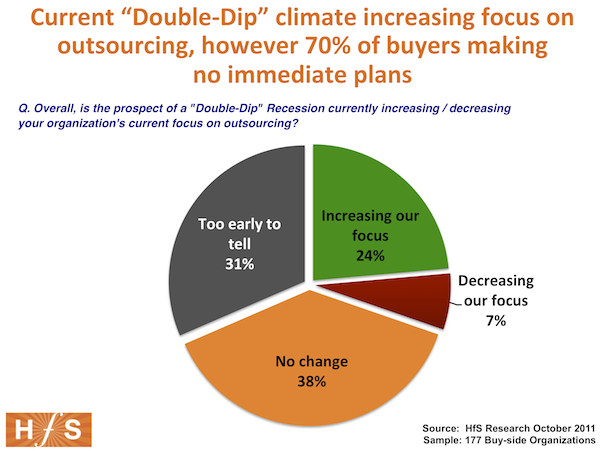
Innovation? Value? Hmmm… I'll stick to chestnuts
While outsourcing clearly provides a vehicle to help under-pressure business leaders coerce some of the change they need to embrace in today’s uncertain economy, most do not view it as the only lever to pull to achieve their goals. The majority of today’s buyers are still trying to figure out what sourcing levers they have at their disposal, uncertain as to the right approach for their organizations.
Our new study that covered the intentions and observations of 534 buyers, advisors and providers with their sourcing strategies, in the event of a “Double-Dip” Recession, reveals one major shift in the industry: most buyers now recognize what their businesses need to improve to drive productivity, they simply are struggling to figure out how to marshall their internal and external resources to help them get there. And a rocky economy isn’t helping drive definitive behavior, with seven-out-of-ten buyers expecting either little change in focus when it comes to outsourcing, or they simply do not know what they are going to do:

* Unlike the 2008 crash, which drove shock and awe into the boardrooms of every business, shouldn’t 2011’s threat of economic adversity be precipitating a calmer, more organized approach to business planning?
* While experiences of 2008 have provided an expectation that further catastrophe is just around around the corner, shouldn’t buyers be far more assertive with planning new measures to contain costs and find new areas for productivity and growth?
The Bottom-line: Buyers are looking more broadly than simply outsourcing to drive productivity improvements in today’s climate
Indeed, today’s harsh business realities are driving more focus on organizations aligning both their outsourcing and shared services frameworks (click here to download a copy of our Global Business Services paper), however, are companies panicking and screaming: “Help! We must hurl as many of our fixed administrative costs out of the window asap and deploy as much low-cost service delivery as we can, regardless of the consequences”? Of course they aren’t – they’re also looking at measures such as their ability to have more flexible global operations, to standardize processes across geographies and ERP instances and to align their internal stakeholders more effectively. Cost-control is a measure that is always a constant focus, however outsourcing doesn’t always provide that answer, especially with experienced businesses that have already moved out a lot of tangible cost in areas such as transactional accounting and application support. Outsourcing only provides part of the answer.
As we recently discussed, business leaders are beset by multiple business pressures in today’s climate, and outsourcing provides just one lever among many that they can choose to pull. Only 13% of buyers are concerned about the disruption caused by outsourcing, hence if they currently only view outsourcing as a cost-reduction lever, they are going to place it in a pecking order of other cost-reduction measures… and it’s not always going to the most effective short-term measure in a tough economy. It’s the job of advisors and providers to educate and demonstrate to buyers the benefits beyond cost-reduction and help clients embed outsourcing among their internal governance practices to align its benefits with those provided by internal process improvement and shared services.
We’ll reveal all in Part II coming shortly to an HfS website near you…
Posted in : Business Process Outsourcing (BPO), hfs-2011-double-dip-recession-study, IT Outsourcing / IT Services, the-industry-speaks







[…] in the coming weeks and months. A Double-Dip Recession will polarize governments and most likely paralyze uncertain businesses. Most of you who frequent our blog and research sites make a decent living buying, advising or […]